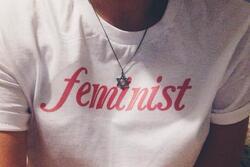Can Feminism and Orthodox Judaism Coexist? I Say Yes.
Growing up as the oldest of three girls, I have always been taught that my position in the Jewish community is an important one. I was taught that when I grow up I’ll get the opportunity to be an active participant within my Jewish community. I was taught that I should always do whatever I can to be a part of and to help build that community, no matter where I lived. So as a little girl, I did. I followed my mom around at temple events trying to be helpful, I led the entire service at my Bat Mitzvah, and I joined two different youth groups when I was old enough. I began to get even more involved, working at the Hebrew school I grew up attending and taking on leadership positions within my youth groups. I was proud to be a part of my Jewish community, and I enjoyed building relationships with my fellow Jews, both old and young.
That was all before I went to Israel the summer before my junior year. The trip I went on was very religious, and placed an emphasis on learning. What we chose to learn, however, was often left up to us. So I chose to question what I saw. Why did I have to stand apart from the men during prayers? Why was I segregated in a much smaller section without any access to a Torah during my visits to the Kotel? And why was I urged to dress in a modest fashion when I was surrounded by men in shorts? I began to read about these issues, which only made me question further. I debated with our Rabbi while hiking through the Golan. I discussed with my female advisers while relaxing in the Dead Sea. And I didn’t settle. I took what I had learned and picked what made sense to me, but I also objected to things that to me, appeared to be nonsense.
Like many, I left the Promised Land a different person than when I arrived. Yes, I had fallen in love with the land and its people, but it was more than that. I left that summer with a different viewpoint on my religion, one that left me very confused. During that summer I had discovered the beauty that lies in the traditions of Orthodoxy. I had found the peace that comes in unplugging for Shabbat, and the sense of calm that derives from praying three times a day.
However, not everything stuck when I returned home – my shul had different views on women in Judaism than those I had discovered over the summer, and it left me with conflicting viewpoints. My shul encouraged me to chant Torah and Haftorah, and to be involved in the service as I was before I left. I had spent the whole summer not doing these things, and learning to accept the fact that I could not. This left me questioning: what was the right way to do things? Was it possible to be a proud feminist, yet still be religious? Many told me that I would have to compromise. I could either be a proud feminist and a somewhat religious Jew, or I could be a religious Jew and sacrifice some of my feminism. I was never satisfied with that. I think it is possible to be a religious Jew, and to be a feminist. Just because I don’t wear a Tallis or Teffilin doesn’t mean that I am not a feminist. To me, there is so much more to feminism than simply having the ability to wear a Tallis when I pray. So much of feminism is having the ability to learn, to discuss, and to hold meaningful positions within my community. These are all things that I have gotten to do as a religious Jew.
Many people have argued with me that Orthodox Judaism oppresses women, that as a proud feminist I would never be happy living that sort of life. However, from my perspective the ideas of Orthodox Judaism and feminism support each other. Many feminists argue that woman should be able to wear what they want – I am a firm believer in the idea that school dress codes are harmful to young girls who shouldn’t have to dress a certain way for their fellow classmates. Isn’t that exactly what Tznius is? Women choosing to cover themselves up, thereby allowing themselves to be judged by their inner selves, not by their appearances? As a teen, I am often expected to be dressed in short shorts and crop tops – but as a feminist, isn’t it my choice to dress more conservatively? No matter how I dress, I am doing it because I want to – not because I want to be judged by men or society. Feminism and Tznius both allow me to dress as I want, and to dress that way because I make the decision to do so, not because anyone else wants me to.
So yes, I do believe that I can be a religious Jew, and a proud feminist. While I have yet to find exactly where I can be a Jew and a feminist, I know that option is the best one for me. For me, my Judaism and my feminism always have and always will go hand in hand.
This piece was written as part of JWA’s Rising Voices Fellowship.








It is one thing to make a decision, another for the community to make the decision for you and to say you are only welcome if you do it our way. Modern orthodoxy enables greater choices; fundamentalists are all about control. Feminism is about choice and if your community doesn't give women choices but sets all the rules, I question that.